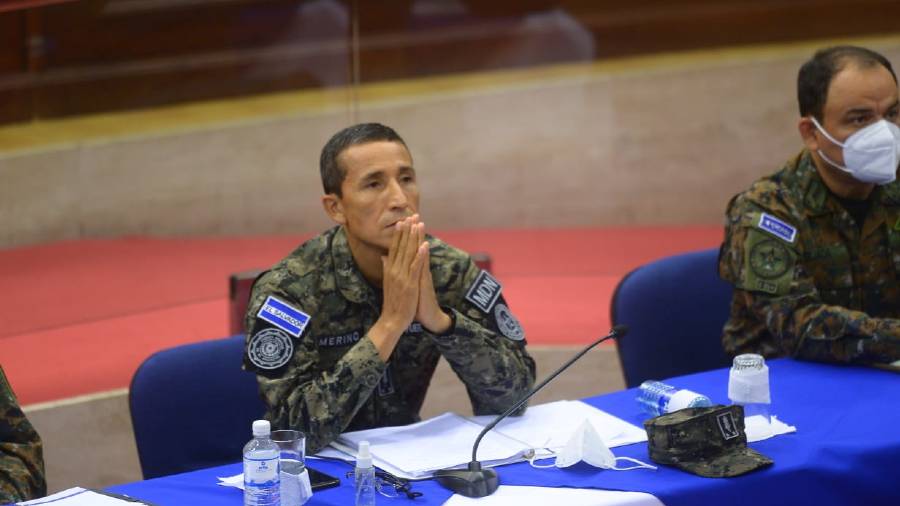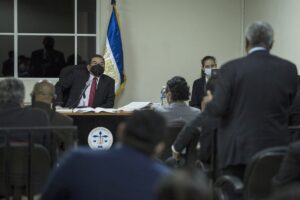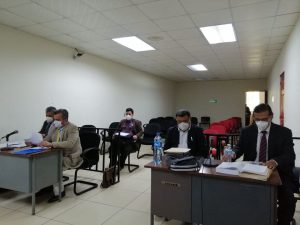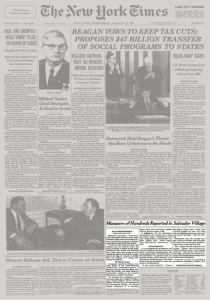Historical Memory, Human Rights, Politics
Mozote files – Defense Minister says they will not comply with a judicial order that, according to him, has no legal basis
FACTUM reports:
The Minister of National Defense, Francis Merino Monroy, asked the magistrates of the Supreme Court of Justice to stop the inspection of military archives scheduled for next Monday, September 21, as part of the proceedings ordered by a judge in the criminal case for the massacre that occurred in El Mozote in 1981.
The Minister wrote to the 15 magistrates of the Court that the opening of the military files of four decades ago could put national security at risk, as defenders of those accused of the massacre and the Presidency of the Republic have argued before.
The minister believes that he is not obliged to comply with the judicial order for an inspection issued by the San Francisco Gotera Investigating Court, located in the department of Morazán. Merino Monroy alleged that the criminal case of El Mozote is following the already repealed Penal Code of 1973, which was in force when the massacre occurred, and, therefore, the Ministry of Defense “is not obliged to comply with a judicial decision without a valid legal support”. To convince the magistrates, the Minister alluded to a regulation that is not in force either: the Political Constitution of 1962, which established that the Legislative Assembly could not have access to the military plans of that time.
Defense did not follow the appropriate procedure when there is disagreement with a judicial decision. If a judge issues a resolution, the parties involved can go to the immediate higher court, which in this case would be a Criminal Chamber, to try to reverse the decision. The Supreme Court, which is the highest administrative authority of the Judicial body, does not have legal powers to modify the jurisdictional decisions made by each court in the country.
The plenary, made up of 15 magistrates from the four chambers, learned of the Minister’s request during the September 10 meeting, but decided to reject it, according to different sources.
The review of the military files is unprecedented in El Salvador. For the first time, since the signing of the Peace Accords, a judicial authority ordered to enter military bases to search for evidence of the massacre of almost a thousand civilians, committed in December 1981. The court had to order a direct inspection because, four years after reopening the case, all the documents that he requested from the Ministry of Defense, through the Presidency of the Republic were denied. Gotera’s investigating judge, Jorge Guzmán, has made at least 10 requests for information during the entire process.
Until last Wednesday, September 16, the court did not know about the document that the Minister presented to stop the review of the files. Last August, the Presidency tried to persuade the judge to desist from searching for evidence in the military files, but he replied that judicial decisions are not negotiable and must be followed. The Court has already rejected before the argument that the inspection may endanger national security because they are not requesting military plans to be executed.
The court has received an average of 50 statements since the case was reopened. In some, they have found contradictions. “There are some where they locate commander Domingo Monterrosa at the scene of the events, but (the) reports from the General Staff (which include) a section of his service record (do not show) any armed operative in the north of Morazán” said Dalila Salmerón, one of the judicial collaborators assigned to the case since its reopening.
In the case of El Mozote, 18 members of the Army are being prosecuted. “Something that also draws attention is that only accused who are deceased appear in armed operative reports, not those who are being processed. Or they are hiding information, and it makes us wonder what is happening”, added Salmerón.
“There is a historical pattern of concealing military information for many years, but since the amnesty was declared unconstitutional, this pattern among authorities has become more evident, and we heard a Defense Minister, David Munguía Payes, saying that the files had been destroyed and that did not exist”, said last week David Morales, director of strategic litigation at CRISTOSAL, the organization that, together with Tutela Legal, are part of the lawsuit in the El Mozote case.
Morales recalls that the blockade of military files was maintained even during the 10 years of the FMLN government. For that reason, CRISTOSAL considers that the inspection scheduled for this Monday “constitutes a historic milestone in the search for truth and justice for the victims of war crimes and crimes against humanity that occurred during the internal armed conflict”.
Colonel Inocente Montano, former Vice Minister of Public Security (1989-1992) was convicted on September 11 for the massacre of Jesuit priests and their collaborators, perpetrated in November 1989, another of the most emblematic cases of the Salvadoran civil war. The National High Court of Spain sentenced him to 133 years in prison. Several high-ranking Salvadoran government officials provided statements on this conviction: “Let’s rejoice, one of the assassins has been convicted, but let’s go deep. When will the political, economic and military terrorists of our history pay for their crimes?”, posted on his Twitter account the private secretary of the Presidency, Ernesto Castro.
Alegrémonos, uno de los magnicidas ha sido condenado, pero vayamos a lo profundo. ¿Hasta cuándo pagarán por sus crímenes los terroristas políticos, económicos y militares de nuestra historia? Y cierro: ¿quién era el comandante general de la FAES y qué intereses representaba?
— Ernesto Castro (@ECastroES) September 11, 2020
Read the full story (In Spanish) HERE




